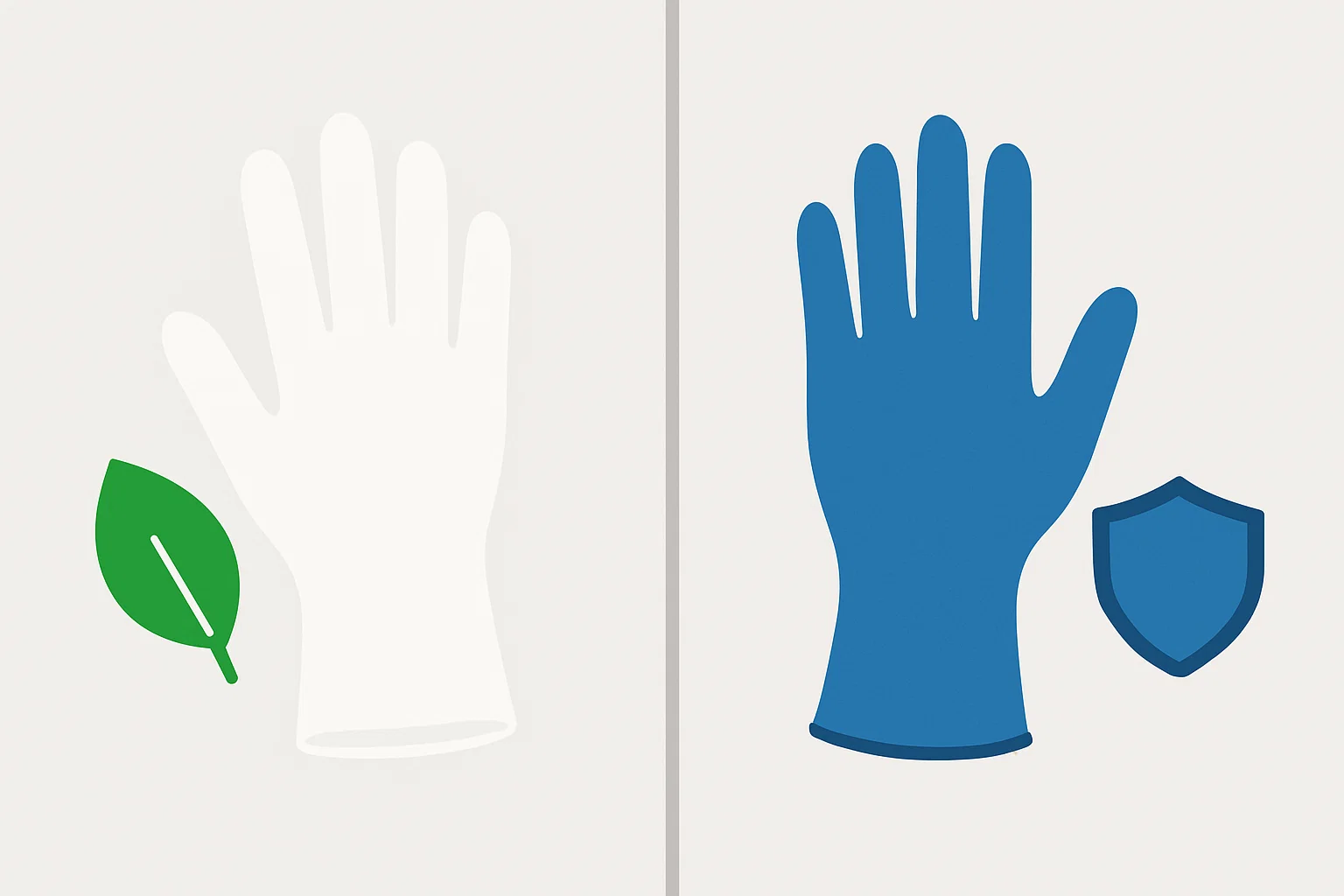Guanti in TPU contro guanti in nitrile: Qual è la scelta migliore per la vostra azienda?
Nelle professioni in cui sicurezza, igiene e precisione sono fondamentali, la scelta dei guanti monouso è una decisione cruciale. Per anni il nitrile è stato il materiale preferito, ma un concorrente più avanzato, il poliuretano termoplastico (TPU), si sta rapidamente affermando per le sue qualità superiori. Per i responsabili degli acquisti e i professionisti del settore, la comprensione delle differenze tra questi materiali è fondamentale per garantire l'efficienza operativa, la sicurezza dei lavoratori e l'efficacia dei costi.
Questa guida completa, realizzata dagli esperti di Damao Tec, approfondisce un confronto dettagliato tra guanti in TPU e nitrile, aiutandovi a determinare quale sia la soluzione ottimale per le vostre esigenze aziendali.
Capire i contendenti: Cosa sono i guanti in TPU e Nitrile?
Prima di un confronto diretto, è essenziale comprendere i materiali stessi.
Cosa sono i guanti in nitrile?
I guanti in nitrile sono realizzati con un copolimero di gomma sintetica chiamato gomma nitrile-butadiene (NBR). Sono emersi come una popolare alternativa al lattice, principalmente per risolvere i problemi di allergia al lattice. Conosciuti per la loro forza e resistenza chimica, i guanti in nitrile sono diventati un punto fermo negli ambienti medici, industriali e di ristorazione.
Cosa sono i guanti in TPU?
Il poliuretano termoplastico (TPU) è una classe unica di polimeri che colma efficacemente il divario tra gomma e plastica. Il risultato è un materiale eccezionalmente elastico, resistente e liscio al tatto. I guanti monouso in TPU sono una soluzione innovativa per la protezione delle mani, in grado di offrire una miscela di comfort, elasticità e sicurezza che spesso supera i materiali dei guanti tradizionali. Damao Tec è stata all'avanguardia nello sfruttare questa tecnologia per produrre dispositivi di protezione ad alte prestazioni.
Un confronto testa a testa: L'analisi approfondita di Damao Tec
La scelta del guanto giusto richiede un'attenta valutazione di vari fattori di prestazione. Ecco come il TPU e il nitrile si confrontano.
Elasticità, comfort e vestibilità
Nitrile: I guanti in nitrile sono noti per la loro aderenza, che consente una buona destrezza. Tuttavia, sono meno flessibili del lattice di gomma naturale. Sebbene le tecniche di produzione abbiano migliorato il loro comfort, l'uso prolungato può talvolta portare all'affaticamento della mano.
TPU: È qui che il TPU eccelle. I guanti in TPU sono rinomati per la loro elasticità superiore e per la sensazione di morbidezza, offrendo una vestibilità confortevole che imita una seconda pelle. L'elevato livello di flessibilità garantisce agli utenti di svolgere compiti precisi e delicati senza alcuna limitazione di movimento, rendendoli eccezionalmente confortevoli per un uso prolungato.
Durata e resistenza alla perforazione
Nitrile: Un vantaggio fondamentale del nitrile è l'eccellente resistenza alla perforazione, spesso indicata come da tre a cinque volte superiore a quella del lattice. Ciò rende i guanti in nitrile una scelta solida per le attività che prevedono l'uso di oggetti appuntiti o in cui la resistenza allo strappo è una priorità, come nel settore medico o meccanico.
TPU: I guanti in TPU offrono una notevole resilienza e sono altamente resistenti alle abrasioni, agli strappi e alle perforazioni. Nonostante la loro natura leggera e flessibile, la loro resistenza intrinseca spesso soddisfa o addirittura supera quella di alcuni gradi di nitrile in scenari specifici. Questa durata si traduce in un minor numero di cambi di guanti durante le attività più impegnative, migliorando sia la sicurezza che l'efficienza.
Resistenza chimica: Proteggere le mani
Nitrile: Il nitrile vanta una forte resistenza a un ampio spettro di sostanze chimiche, in particolare oli, acidi, carburanti e solventi. Ciò rende il nitrile una barriera affidabile in laboratorio, nella manutenzione automobilistica e nella manipolazione di molti comuni agenti detergenti.
TPU: Il TPU offre anche una buona resistenza a molti oli, grassi e alcuni solventi comuni. Anche se il nitrile può avere un vantaggio nei confronti di una gamma più ampia di sostanze chimiche aggressive, il TPU offre una protezione affidabile per molte applicazioni nell'industria alimentare, manifatturiera e delle pulizie. Per la compatibilità chimica specifica, è sempre meglio consultare le linee guida del produttore.
Proprietà ipoallergeniche e sensibilità cutanea
Nitrile: Essendo un materiale sintetico, il nitrile è privo di proteine del lattice, il che lo rende una scelta eccellente per i soggetti allergici al lattice di Tipo I. Tuttavia, alcuni guanti in nitrile contengono acceleratori chimici, utilizzati durante il processo di vulcanizzazione, che possono causare dermatiti allergiche da contatto di tipo IV in una piccola percentuale di utilizzatori.
TPU: I guanti in TPU sono una soluzione realmente ipoallergenica. Sono intrinsecamente privi di proteine del lattice e non richiedono gli stessi plastificanti (come gli ftalati) o acceleratori chimici presenti nei guanti in vinile e in alcuni guanti in nitrile. Questo li rende una scelta eccezionalmente sicura per gli utenti con pelle sensibile o soggetti ad allergie.
L'impronta ambientale: Un'alternativa più verde?
Nitrile: I guanti di nitrile standard sono derivati dal petrolio, una risorsa non rinnovabile, e non sono biodegradabili, in quanto impiegano centinaia di anni per decomporsi in una discarica. Sebbene il nitrile sia tecnicamente riciclabile, richiede programmi di riciclaggio specializzati che non sono ampiamente accessibili e non può essere mescolato con il riciclaggio generale. I guanti contaminati, soprattutto in ambito medico, non possono essere riciclati.
TPU: Questo è un punto di differenziazione significativo. Molti materiali in TPU sono progettati per essere biodegradabili, in grado di decomporsi in soli 3-5 anni nelle giuste condizioni di discarica. Inoltre, essendo un materiale termoplastico, il TPU è spesso riciclabile e può essere rilavorato senza una significativa perdita di integrità strutturale. La produzione di TPU può anche essere più efficiente dal punto di vista energetico rispetto ad altre materie plastiche. Per le aziende attente alla sostenibilità, i guanti in TPU di fornitori come Damao Tec rappresentano un'opzione molto più ecologica.
Costo-efficacia: Una prospettiva a lungo termine
Nitrile: I guanti in nitrile offrono generalmente un buon equilibrio tra costi e prestazioni. Sebbene il loro prezzo possa essere più volatile di quello del vinile a causa dei costi delle materie prime, sono un'opzione durevole e affidabile per molti settori.
TPU: Inizialmente, il costo dei guanti in TPU può essere superiore a quello di alcune alternative in nitrile. Tuttavia, la loro durata superiore può portare a un minor numero di guanti utilizzati nel tempo, riducendo il consumo complessivo e gli sprechi. Se si considerano i vantaggi di un maggiore comfort, sicurezza e sostenibilità, i guanti in TPU rappresentano spesso un valore maggiore a lungo termine.
Raccomandazioni specifiche per il settore: Il guanto giusto per il lavoro
La scelta del guanto ideale dipende spesso dalle esigenze specifiche del settore.
Industria alimentare e della ristorazione
Sia i guanti in TPU che quelli in nitrile sono adatti alla manipolazione degli alimenti e sono spesso certificati come sicuri per gli alimenti (ad esempio, secondo la norma EN1186 nel Regno Unito).
- Nitrile è una scelta popolare per la sua resistenza ai grassi e agli oli animali.
- Guanti in TPUessendo privi di plastificanti e inodori, sono una scelta sempre più preferita. La loro eccellente destrezza è un vantaggio importante per le attività di preparazione degli alimenti più complesse.
Ambienti medici e sanitari
Per gli esami non sterili, entrambi i materiali possono essere efficaci.
- Nitrile è ampiamente utilizzato in ambito medico grazie alla sua elevata resistenza alla perforazione e alla comprovata protezione barriera contro gli agenti patogeni trasmessi per via ematica. I guanti di nitrile per uso medico devono soddisfare i rigorosi standard stabiliti da enti normativi come la FDA.
- TPU è un'altra opzione eccellente, soprattutto nei casi in cui le allergie al lattice e la sensibilità della pelle sono un problema importante. Il loro comfort è un vantaggio significativo per gli operatori sanitari che indossano i guanti per periodi prolungati.
Applicazioni per estetisti, saloni di bellezza e tatuatori
L'igiene e la protezione chimica sono fondamentali in questo settore.
- Nitrile è la scelta migliore per molti professionisti della bellezza grazie alla sua robustezza e resistenza alle sostanze chimiche presenti nelle tinture per capelli, nei solventi e in altri prodotti di bellezza. La sua resistenza alla perforazione è essenziale anche per i tatuatori.
- TPU La combinazione di flessibilità, durata e proprietà ipoallergeniche ne fa un nuovo forte concorrente. Offre la destrezza necessaria per applicazioni precise come la manicure o i trattamenti estetici, proteggendo al contempo la pelle.
Perché scegliere Damao Tec per le vostre soluzioni di guanti?
Damao Tec è impegnata nell'innovazione e nell'eccellenza degli indumenti protettivi per le mani. Siamo consapevoli dell'evoluzione delle esigenze delle industrie moderne e della crescente importanza delle prestazioni e della sostenibilità. La nostra gamma di guanti monouso in TPU è progettato per offrire una soluzione superiore che aumenta la sicurezza, migliora il comfort dell'utente e supporta gli obiettivi ambientali della vostra azienda. Scegliendo Damao Tec, collaborate con un'azienda lungimirante che si impegna a fornire prodotti di alta qualità, affidabili e responsabili.
Domande frequenti (FAQ)
1. I guanti in TPU sono completamente sicuri per le persone allergiche?
Sì, i guanti in TPU sono una scelta eccellente per chi soffre di allergie. Sono naturalmente privi delle proteine del lattice che causano le allergie di tipo I e in genere non contengono gli acceleratori chimici presenti in alcuni guanti di nitrile che possono scatenare la dermatite di tipo IV, il che li rende un'opzione altamente ipoallergenica.
2. Posso riciclare i guanti in TPU e nitrile nel mio contenitore standard?
Nessuno dei due tipi di guanti deve essere inserito nei normali contenitori per il riciclaggio. I guanti in nitrile richiedono impianti di riciclaggio specializzati a causa della composizione del materiale. Anche se una parte del TPU è riciclabile, anch'essa deve essere inviata a strutture appropriate. In particolare, i guanti contaminati da alimenti, sostanze chimiche o biologiche devono essere smaltiti secondo le norme locali sui rifiuti.
3. I guanti in TPU sono resistenti come quelli in nitrile?
I guanti in TPU sono sorprendentemente forti e durevoli, con un'elevata resistenza a strappi e abrasioni. Mentre i guanti in nitrile per impieghi gravosi possono offrire una resistenza superiore alla perforazione per compiti ad alto rischio, i guanti in TPU offrono una resistenza più che adeguata per una vasta gamma di applicazioni e spesso possono superare i gradi di nitrile standard.
4. Per la manipolazione di sostanze chimiche, il nitrile è sempre la scelta migliore?
I guanti in nitrile offrono generalmente una resistenza a un'ampia gamma di sostanze chimiche aggressive, e sono quindi la scelta ideale per molti laboratori e ambienti industriali. Tuttavia, i guanti in TPU offrono una buona resistenza a sostanze comuni come oli, grassi e molti solventi, rendendoli perfettamente adatti a molti ambienti professionali. Controllare sempre la tabella di resistenza chimica del produttore in base alle sostanze specifiche che si maneggiano.







